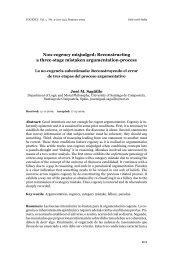Cogency 1 x
Cogency 1 x
Cogency 1 x
Create successful ePaper yourself
Turn your PDF publications into a flip-book with our unique Google optimized e-Paper software.
COGENCY Vol. 1, N0. 1 (7-8), Winter 2009 I.S.S.N. 0718-8285<br />
Editorial<br />
History begins here. In the future, this journal might be remembered as a<br />
brave act of will, or as a superfluous project, or as a bad investment, or the<br />
opposite of these scenarios. But none of the negative possibilities or positive<br />
prospects are good reasons today to stop doing what is necessary: to<br />
create new paths of communication for those interested in the phenomenon<br />
of reasoning and argumentation, both at a theoretical and a practical<br />
level.<br />
In September 2009, <strong>Cogency</strong> opens its doors to the international academic<br />
world in the hope of contributing to the study of reasoning and argumentation<br />
by means of a new space for discussion across related fields, such<br />
as logic, informal logic, psychology of reasoning, artificial intelligence, communication<br />
studies, rhetoric, argumentation theory, discourse analysis, linguistics,<br />
law, education, among others fields and disciplines.<br />
<strong>Cogency</strong> is a journal of the Centre for the Study of Argumentation and<br />
Reasoning (CEAR) at the Faculty of Psychology, Diego Portales University,<br />
Chile. At CEAR, we are convinced that by opening up this space opportunities<br />
are provided to the theoretical and empirical study of argumentation<br />
and reasoning with a technical and social interest.<br />
To address these challenges, this journal emerges with a clear<br />
multidisciplinary vocation and, for this reason, we kindly invite the academic<br />
community to support this project by submitting articles and book<br />
reviews that combine innovative proposals and revisions of all topics implied<br />
in the ecology of argumentation and reasoning.<br />
Some of these general aims are already reflected in this inaugural<br />
volume, where some of the key dimensions in the study of reasoning and<br />
argumentation are investigated by the following authors (in alphabetical<br />
order): partially from a logical point of view, First Margaret Cuonzo pro-<br />
7
COGENCY Vol. 1, N0. 1, Winter 2009<br />
poses a way to resolve paradoxes, namely: to analyse the implicit intuition<br />
that motivates accepting the parts of the paradox; from the point of view of<br />
argumentation theory, particularly the pragma-dialectical perspective, Frans<br />
H. van Eemeren and Bart Garssen shed light on the fallacies of composition<br />
and division by outlining their parameters; from an informal logic perspective,<br />
Trudy Govier reveals how to deal with the gap between logical opposition<br />
and social opposition; also from an informal logic point of view, Ralph<br />
H. Johnson thoroughly discusses the project of informal logic itself, by showing<br />
its strengths and weaknesses; to accept rhetoric as action-oriented discourse<br />
is the proposal that Christian Kock offers as an angle from which to<br />
understand the problem of constant conflict of value concepts in audiences<br />
and arguers; using Ducrot’s semantic-argumentative perspective, Carolina<br />
Tosi investigates the linguistic strategies social sciences secondary textbooks<br />
in Argentina use to direct the reader.<br />
From now on into the future, the team will work to be remembered as<br />
having a good cooperative project in hand and for investing its money wisely.<br />
CRISTIÁN SANTIBÁÑEZ YÁÑEZ, Director<br />
Amsterdam, September 2009<br />
8








